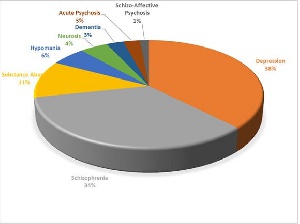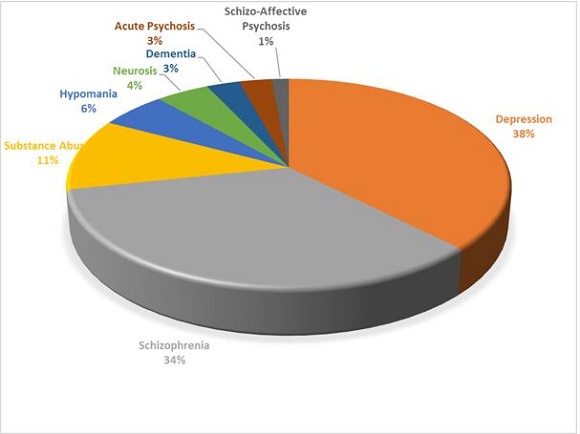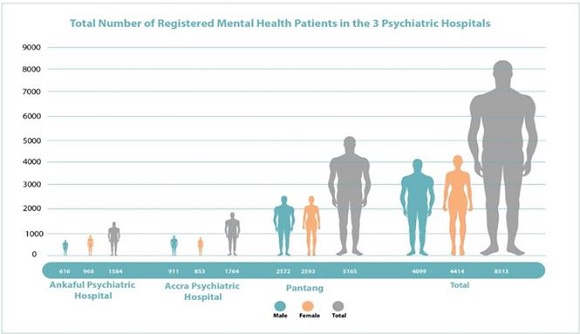 According to the WHO, about 41% of Ghanaians have mild, moderate and severe psychological distress
According to the WHO, about 41% of Ghanaians have mild, moderate and severe psychological distress
Even though, mental health illnesses have been with us since the dawn of time, the issue of funding support in the sector has been the bane for improved mental health services, especially in developing countries, for all these years.
In Ghana, for instance, the Mental Health Authority’s main battle-cry has been lack of funds, despite the passage of the Mental Health Act some five years ago.
Available statistics from the Ghana Mental Health Authority indicates that about 3 million Ghanaians, out of the population of 28 million, are suffering from one mental illness or the other.
This is shocking and government must not look on unconcerned but step up efforts to ensure the Mental Health authority is well resourced to carry out its mandates.
It is also instructive to note that, about 41% of Ghanaians have mild, moderate and severe psychological distress, 19% moderate to severe distress, 7% loss in GDP due to productivity loss and 98% treatment gap (WHO, 2011).
Besides prejudice and discrimination that deprive sufferers of their dignity, financial constraints in our part of the world are also a major inhibitive factor impeding patients from accessing treatments, as some of the medications are very expensive and beyond the means of the ordinary patient.
https://www.ghanaweb.com//GhanaHomePage/NewsArchive/Mental-health-patient-bemoans-high-cost-of-medication-589635

It, therefore, comes as no surprise to me, when Dr. Akwasi Osei, the chief executive officer of the Ghana Mental Health Authority, recently claimed that his outfit has not been given any money to carry out its activities since last year, 2016.
Speaking in an interview recently, Dr. Osei decried government’s indifference towards mental health care in the country, stressing that, since last year, the authority has not been given any money to carry out its activities.
Source: WHO (2011) Top Mental Health diagnosis in Ghana

“For the whole of last year not a pesewa was received from central government for mental health care in the country,” he told the interviewer.
According to him, due to lack of governmental support, mental patients in the country are being treated like prisoners, and that, it is unfortunate the sector has been neglected by successive governments.
Dr. Osei could not have said it better; successive governments have paid lip-service to the sector for far too long, and the earlier they put in concrete measures, the better for all of us, since everyone is prone to mental illnesses.
Interestingly, however, the Legislative Instrument (LI) to back the Mental Health Act 2012 to enable it to get mandatory funding to support mental health care in the country seems to be in limbo.
The objective of the fund is to provide financial resources for the care and management of persons suffering from mental disorders. It is also to be applied for skills-training, rescue, rehabilitation and reintegration of persons with mental disorders and construction of facilities for mental patients, among others.

According to the authority, it has met with the parliamentary select committee on health and the subsidiary committee in charge of LI’s on the way forward and that barring any last minute hitches, the LI will be passed by the end of the year.
I think this is a positive development; the stakeholders must therefore work in earnest to bring the LI into fruition. I think this is a positive development; the stakeholders must therefore work in earnest to bring the LI into fruition.
Even though, the LI is not the panacea for mental health care, I am hopeful that it would pave the way for the introduction of a sustainable mental health levy which will be used to solve most of the major challenges the sector encounters.